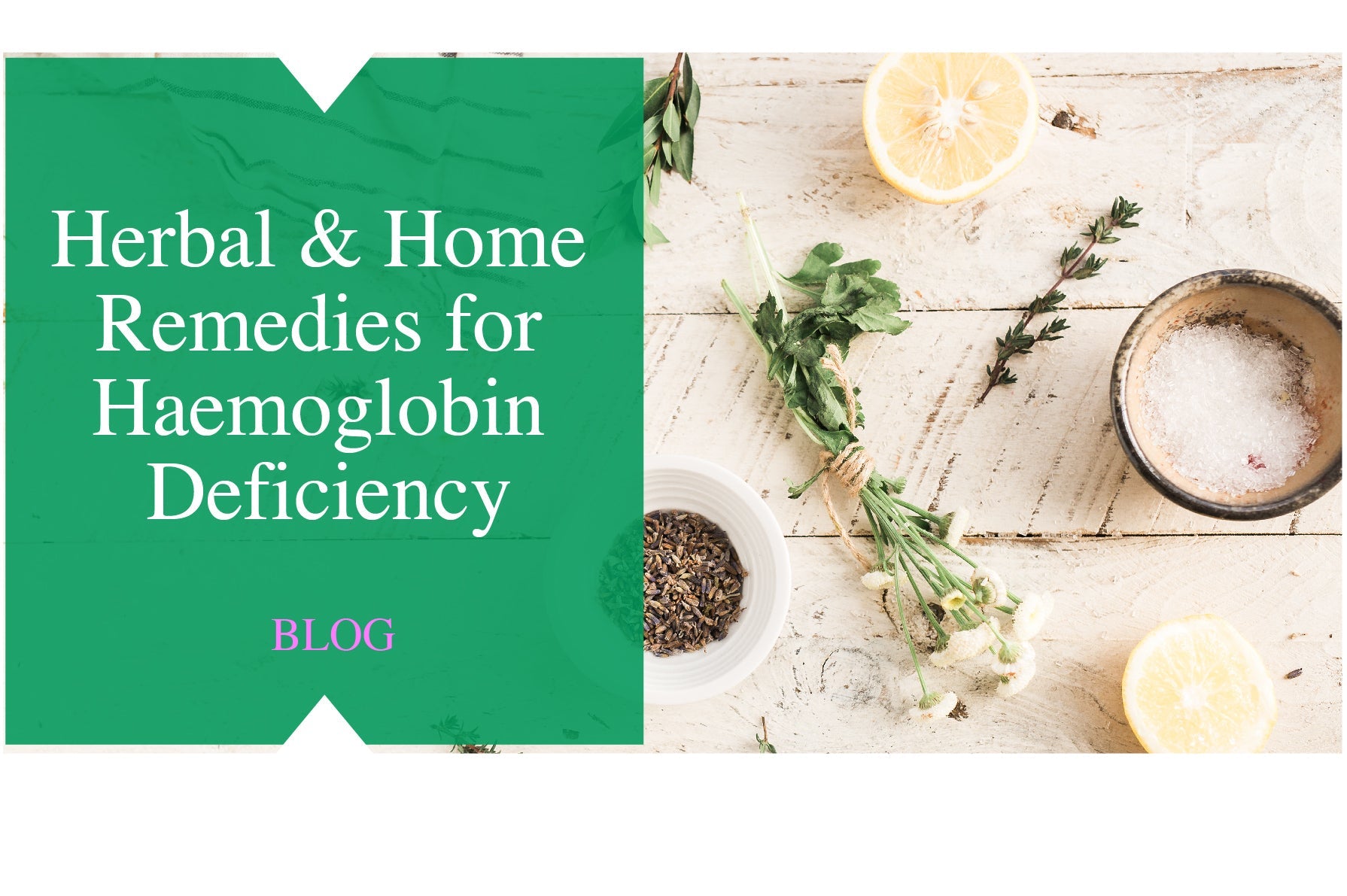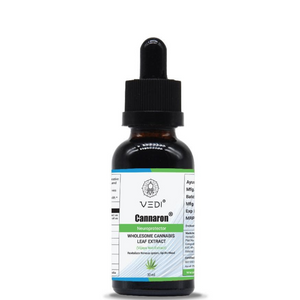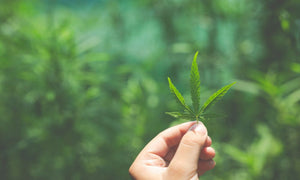Herbal & Home Remedies for Haemoglobin Deficiency

Are you feeling tired, weak, or dizzy? These could be signs of hemoglobin deficiency, a condition that can leave you low on energy and struggling to stay healthy. Hemoglobin is a vital protein in your red blood cells that carries oxygen throughout your body, and its deficiency can lead to various health issues. While there are medicines you can take to treat hemoglobin deficiency and its symptoms, many people are turning to natural solutions.
In this blog, we will discuss some of the best natural solutions for hemoglobin deficiency and regain your energy through the power of nature.
What is Hemoglobin?
Hemoglobin is a protein inside red blood cells that carries oxygen from the lungs to tissues and organs in the body and carries carbon dioxide back to the lungs. When hemoglobin levels are low (anemia), people may feel tired and weak.
There are several natural ways to increase hemoglobin levels, including eating an iron-rich diet, vitamin B12, and folic acid. Good sources of iron include red meat, dark leafy greens, nuts, beans, and fortified cereals. Vitamin B12 is essential for the production of healthy red blood cells in the body and can be found in dairy products, eggs, and chicken. Folic acid is another important nutrient for red blood cell production. Good sources of folic acid include leafy green vegetables, legumes, nuts, and fortified cereals.
What is the normal range for hemoglobin?
The normal range of hemoglobin is between 12 and 18 grams per deciliter (g/dL) or 120 to 180 grams per liter (g/L). The normal range of hemoglobin for men is 13.5 to 17.5 grams per deciliter, and for women, it is 12.0 to 15.5 grams per deciliter.
What causes hemoglobin deficiency?
A variety of factors could cause low hemoglobin levels. Some common causes include:
- Blood loss: This can happen from heavy menstrual bleeding, injuries, surgery, or bleeding in the digestive system.
- Nutritional deficiencies: A diet low in certain nutrients can cause low hemoglobin levels. Its examples include iron, folate, and vitamin B12 deficiency.
- Destroyed red blood cells: Red blood cells get destroyed by certain medications, infections, or autoimmune disorders.
- Bone marrow problems: Some diseases can damage the bone marrow’s ability to produce more red blood cells. A few examples include leukemia, cancer, and aplastic anemia.
Symptoms of hemoglobin deficiency or anemia
The most common symptom of low hemoglobin levels is feeling tired all the time, even if you are getting enough sleep. You may also experience shortness of breath, dizziness, or headaches.
Other symptoms include:
- Fatigue & lack of stamina
- Trouble breathing
- Weakness
- Pale or yellowish skin
- Hair loss
- Irregular heartbeats
- Shortness of breath
- Dizziness or lightheadedness
- Chest pain
- Cold hands and feet
- Poor appetite
Herbal & Home Remedies to Increase Hemoglobin Levels
Sesame seeds
Loaded with iron, copper, zinc, selenium, vitamin b6, folate, and vitamin E, regular consumption of black sesame seeds improves hemoglobin levels and promotes iron absorption.
Yogurt & turmeric
In the book, ‘ayurvedic home remedies', dr. Vasant Lad suggests that those suffering from kapha-type anemia should have a cup of yogurt twice a day, morning and afternoon, with a teaspoon of turmeric.
Dates & raisins
Snacking on 3-5 dates and a tablespoon of raisins can provide you with instant energy and augment iron levels.
Ghee
According to Ayurveda, the root of anemia is an aggravated pitta. Ghee balances the pitta dosha, and thus, consuming 10 ml of ghee early in the morning on an empty stomach can help alleviate anemia.
Cook in iron utensils
The food cooked in an iron utensil absorbs iron from it, making itself potent for an anemic patient.
Eat in copper utensils
Eating food and drinking water out of copper utensils is seen to increase blood hemoglobin levels dramatically.
Eat red & green fruits and vegetables
Apples, beetroots, and pomegranates are all rich sources of iron and folic acids. Leafy green vegetables such as spinach also help in fighting hemoglobin deficiencies.
Citrus fruits
Citrus fruits contain vitamin C, which aids absorption of iron in the body.
Banana smoothies
Banana is rich in iron and also a high source of magnesium. It stimulates the production of hemoglobin and enzymes for the formation of red blood cells.
Dry fig milkshake
Regular intake of about 50g of dried figs daily can increase the blood hemoglobin count of anemic patients by around 0.5% per week.
Moringa tea
Moringa leaves are imbued with ample amounts of iron, vitamins A, C, and magnesium. A cup of moringa tea offers 28mg of iron, more than what is present in spinach. Regularly adding moringa leaves is well-known to improve the hemoglobin level and red blood cell count.
Watermelon juice
Watermelon is one of the best fruits that helps to increase hemoglobin due to its iron and vitamin C content that makes the iron absorption process better and faster.
Pumpkin seeds
200 grams of pumpkin seeds serve about eight milligrams of iron and sufficient calcium, magnesium, and manganese content. Sprinkle them over salads or in your smoothies; make use of these tiny delights anywhere you'd want to.
How to Increase Hemoglobin During Pregnancy
Anemia during pregnancy can cause fatigue, dizziness, or shortness of breath. It can also increase the risk of complications, including premature birth and low birth weight.
Below are the ways to increase your hemoglobin levels during pregnancy:
-
Intake of Vitamin C
Vitamin C is an important nutrient for increasing hemoglobin levels during pregnancy. It helps the body absorb iron to produce red blood cells and hemoglobin. Good sources of Vitamin C include citrus fruits, bell peppers, Papaya, Broccoli, and more.
-
Beetroot
Beetroot is a vegetable rich in iron, folic acid, potassium, and fiber. It is a good source of nitrates that helps improve blood flow. These nutrients are important for increasing hemoglobin levels during pregnancy. Beetroot can be eaten raw, cooked, or juiced. It can be added to salads, soups, smoothies, and other dishes.
-
Green leafy vegetables
Green leafy vegetables are a source of iron, folic acid, and other nutrients essential for increasing hemoglobin levels during pregnancy. Good sources are spinach, kale, turnip greens, arugula, etc.
-
Proteins
Protein is crucial for your baby’s growth throughout pregnancy. Good sources of proteins include red meat, poultry, fish, eggs, and dairy products.
-
Amla
Amla, known as gooseberry, is a nutrient-rich fruit that is beneficial for pregnant women. It is a good source of iron, vitamin C, and folic acid, important for increasing hemoglobin levels.
Conclusion:
Anemia is a serious global public health problem that particularly affects young children and pregnant women. WHO estimates that 42% of children less than 5 years of age and 40% of pregnant women worldwide are anemic. Not tackling hemoglobin deficiency can adversely affect our functionality in everyday life. But with these simple and natural tips from Ayurveda, we can maintain great blood health with optimal hemoglobin levels.
Frequently Asked Questions
Q: How to increase hemoglobin naturally for cancer patients?
A: The most common treatments for anemia in patients with cancer include:
- Iron therapy
- Red blood cell transfusion, commonly known as blood transfusion
- Erythropoiesis-stimulating agents (ESAs)
- Other drugs
Your doctor will consider your test results, symptoms, medical history, cancer type, cancer treatment, and other factors while determining the best course of treatment for you.
Q: How to increase hemoglobin naturally in vegetarians?
A: Vegetarians can naturally increase hemoglobin levels by eating:
- Beetroot
- Apples
- Spinach
- Pomegranate
- Pumpkin seeds
- Broccoli
- Tomatoes
- Beans
- Cashews
- Potato
- Lentils
- Strawberry
- Tofu, and much more
Q: Which fruit is best for hemoglobin?
A: Apples, apricots, bananas, grapes, watermelons, and pomegranates play an important role in improving hemoglobin count.
Q: How can I naturally increase my hemoglobin in a week?
A: Beetroot is an excellent source of iron, folic acid, potassium, and fiber, making it one of the best foods for increasing hemoglobin levels quickly.
Q: Which drink increases hemoglobin?
A: Iron-rich drinks are the best to increase hemoglobin. Some drinks that are especially effective at increasing hemoglobin include beetroot juice, pomegranate juice, prune juice, and spinach & mint juice.







